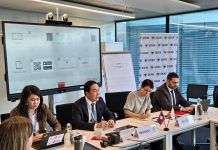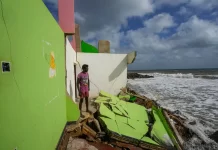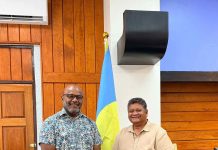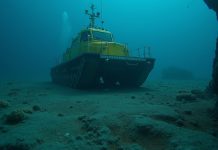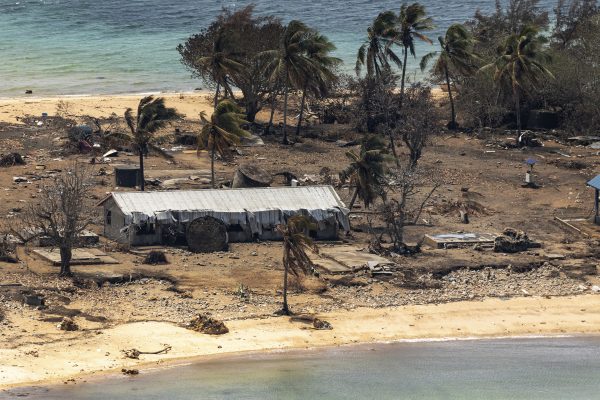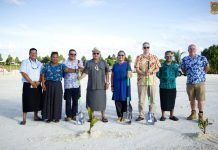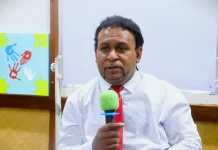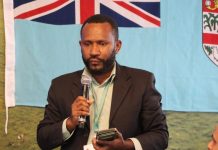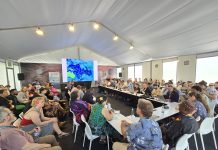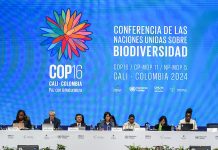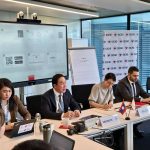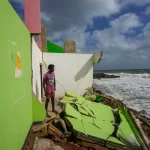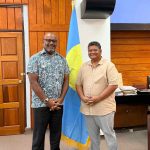The high level political champion flying the flag for Article 6 of the Paris Agreement and its outcomes from COP26 says there is still a long way to go for information, capacity and resourcing for work in this area.
Palau’s Minister of Agriculture, Fisheries and Environment, Steven Victor was an active part of the Pacific high level champions to the COP in Glasgow.
At this week’s UK-Pacific Road to COP27 Dialogue from Suva and online via a livestreamed link, the Minister spoke alongside other climate champions from Fiji and the Marshall Islands of the Pacific preparations to COP27, which will be held in Egypt this November.
“Having been part of a small and committed negotiators from Palau and across the Pacific, I was honoured to be the political champion on Article 6 for Pacific SIDS and Association of Small Island States,” he told the high level opening panel for the dialogue event with the COP 26 Presidency.
COP26 President Alok Sharma joined the online panel with Asia Pacific Climate Ambassador Ken O’Flaherty attending in person, from Suva.
“Despite our diverse range of views on markets, the (Paris) rulebook now requires that 2% of credits be cancelled under the centralised market system. While the percentage should be considerably higher, the principle of cancellation is an important step as it moves the markets into net emission reduction as opposed to what it was in the past as just a carbon offsetting mechanism,” Minister Victor said.
“On the other hand, under the rules, credits registered from 2013 will be allowed to be traded and used by countries towards meeting their mitigation targets. That means 300 million credit units can be traded instead. This could inhibit or delay the development of new mitigation activities needed to drastically curb emissions”
Article 6 is regarded as one of the most contentious of the Paris Agreement Rulebook. It provides a set of three guiding directions to help the transition by all nations to a global net-zero future.
The Glasgow outcomes achieved under article 6, included an agreement to dedicate five percent of share of proceeds (SOP) from carbon markets to go towards adaptation support under the centralised market system.
“We hope that this can be accelerated to help build resiliency under Article 6.4. Noting that Parties are “strongly encouraged” to do the same under 6.2 for Overall Mitigation of Global Emissions (OMGE) and SOPs, it is with great anticipation that the advancement of environmental integrity be realised and adaptation capacity support is achieved as well,” Minister Victor told the Dialogue event.
“Moving forward to Egypt, there needs to be continued special provisions of resources and arrangements in order for our countries and regions to engage in the details of the work programmes for markets and non-markets,” he said.
“There is a substantial work programme for Article 6.2 in 2022, on accounting, reporting tables and registry infrastructure, including submissions and technical workshops….and there is also a substantial work programme for Article 6.4 on centralised mechanism. As the Supervisory Body for mechanism will meet this year to undertake mandated work on rules needed for implementation, and as SBSTA works on processes for implementing agreed elements, including SOP, OMGE and CDM transition, Palau and the Pacific is willing to participate.”
But, he added, “there must be an understanding that in order for the Pacific to engage effectively we need timely information to prepare and rally our limited resources”
Detailing the work programme required on Article 6, Minister Victor showed how the size of the task ahead for Pacific states will require so much support.
“As we attempt to meet the submission dates, we require more information and options that we can work with. In the context of Article 6.2, there must special consideration for SIDS and LDC, specifically with options for the tables and outlines for the information required pursuant to chapter IV of the annex (Reporting) and 6.4 recommendations,” he said.
“While Pacific SIDS may have limited experience with carbon markets considering we contribute less than 0.05% in GHG emissions, some of our states are open and participating in initiatives like Blue Carbon, Indo-Pacific Carbon Offsets and Joint Crediting Mechanism (JCM). The Republic of Palau has partnered with Japan on JCM project which provides subsidies for solar panels in Palau and in turn Palau shares our emission reduction credit with Japan. Therefore, there may be some lessons learned that can be drawn from our experiences, and context as a Small Island Developing State.”
He also called for more attention on non-carbon market approaches such as ecosystem-based adaptation, social sustainability adaptation, nature based-solutions, indigenous and local knowledge, and ocean-based initiatives.
“These are some of the core practices as part of our climate action and would welcome their incorporation in areas around Article 6, as soon as practicable”, Minister Victor said.
Reflecting on his experience from Glasgow, he said the COP26 helped build consensus on issues where there were varying degrees of views, and that the United Kingdom did its best to come up with a process that was fair and inclusive where all Party members were able to participate whether face to face or online.
He said Pacific and other SIDS through AOSIS were present at every step of the deliberation process, and there was support given to help overcome capacity and resources constraints for delegates from SIDS and Least developed countries.
SOURCE: PACNEWS


